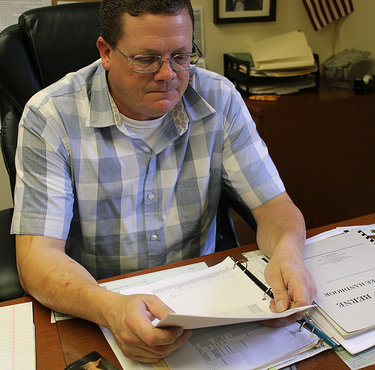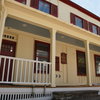Ambulance costs a sticking point in Berne’s $2.9M budget
BERNE — Supervisor Sean Lyons, drafting his first town budget, is using $368,000 from the town’s fund balance and about $50,000 in reserve accounts to keep taxes flat next year. The spending plan totals $2.9 million, up about $82,000 from this year.
Lyons and his fellow Republican, Councilman Dennis Palow, voted against the budget while the three Democratic board members voted for it. After the vote, Palow declined to say why.
Lyons explained later, “The budget that was adopted was not my budget but rather was what was left of my budget after the Democratic majority made massive changes from my supervisor budget. That is why we both voted against adopting the preliminary budget.”
Payment for a county ambulance service dominated politically-divided discussions of the 2019 town budget, with Lyons wondering whether a better service could be found elsewhere.
A budget meeting on Oct. 17 was cut short after some town board members noted the $34,000 needed to cover the cost of the county ambulance service next year wasn’t included in the supervisor’s proposed budget. It was later noted that the bill for service in 2019 would not be sent to the town until 2020, but a payment of $17,000 for the prior year would be due.
Not including special districts, which are funded by taxes in those districts, the budget will be $2.356 million, or up by about $82,000 from this year’s budget of $2.273 million. With special districts included, the budget is about $2.851 million, up by about $89,000 from last year’s budget of $2.762 including these districts.
The $2,355,985 budget proposal calls for $1,155,099 in general-fund expenditures and $1,200,886 in the highway fund. There is $75,601 budgeted for the sewer district, which is covered by an equal amount of unmetered sales.
The total budget is based on revenues of:
— 1,210,678, outside of property taxes, mostly from county sales tax;
— $368,000 from the fund balance, the same amount withdrawn last year;
— $50,120 from seven different reserve accounts; and
— $727,187 in property-tax revenue, with no major change from last year.
Despite a 3.5-percent increase in expenditures for 2019, Lyons said that the tax rate will remain flat in the coming year, primarily due to the use of reserve funds and the fund balance, or rainy-day account.
The tax rate will remain at $4.32 per $1,000 of assessed value, or about $4,300 on a home assessed at $100,000. Last year’s budget, prepared by the ousted Democratic supervisor, Kevin Crosier, saw a 4.02-percent decrease in the tax rate.
Berne has a state-set equalization of 63 percent since it hasn’t conducted a town-wide property revaluation in years.
Fund balance and reserve accounts
Revenues for the 2019 budget include $6,700 from a retirement reserve, $8,500 from the town park reserve, $2,000 from the town hall reserve, $1,000 from the senior transportation reserve, $19,600 from the general fund capital reserve.
At the same time, the plan calls for taking $368,000 from the town’s fund balance: $184,000 from the general fund, $134,000 from a highway fund, $25,000 from another highway fund, and another amount of $25,000 from another highway fund.
Lyons said on Wednesday that it could not yet be determined what will remain in the reserve accounts or the fund balance. He noted that the amounts still have the potential to change with a meeting Wednesday evening before a final budget is determined by Nov. 20.
According to the town’s 2017 annual report, Berne had a total of about $2.9 million in its entire unassigned and assigned fund balances; $1,801,859 for the general fund and $1,080,654 for the highway fund. A total of $31,999 was in the sewer’s fund balance and a negative amount of $43,883 is listed for capital projects.
According to the report, Berne had a total of $2,028,997 in its unassigned fund balance alone for highway and its general fund, with $1,340,809 in its general unassigned fund balance and $688,188 in its highway unassigned fund balance.
In 2016, the town had $1,252,000 in its general unassigned fund balance and $916,428 in its highway unassigned fund balance.
Ambulance increases
At the Oct. 17 budget hearing, town council members Dawn Jordan and Karen Schimmer questioned the amount of money set aside for ambulance services in the budget, which they said would pay for only paramedic coverage from Albany County. Berne still has an active volunteer squad, Helderberg Ambulance, which is supplemented with paid Albany County workers.
Jordan and Schimmer are Democrats who have each served on the board for over five years.
This year, Berne participated in the county’s advanced life support program for a cost not to exceed $104,700, according to minutes from the January 2018 reorganizational meeting. The board vote on this expenditure was unanimous.
Last year, the Albany County Sheriff’s Office informed the three Hilltowns of Berne, Westerlo, and Rensselaerville that the towns would be billed for a new service of basic life support from the sheriff’s emergency medical services division. The towns had already been charged for advanced life support — a county paramedic stationed in a fly car — but the sheriff’s office stated that the new service would be necessary after Rensselaerville’s volunteer ambulance closed last summer.
The cost was divided among the three towns based on population, with the exception of Rensselaerville paying more because it no longer had a volunteer ambulance squad.
Dennis Wood, the lieutenant in charge of the Albany County Emergency Medical Services unit, told The Enterprise this week that the cost for Berne in 2018 was one-fourth the actual cost of running a basic life support service in the town.
“The overall cost is somewhere in the $70,000 mark,” he said.
In 2019, costs for Berne will increase to about half of that, or a little over $34,000, said Wood. The town of Berne will be billed for this in January 2020, he said.
Lyons told The Enterprise on Saturday that it was decided to include the amount for the 2019 basic life support services in the 2019 budget, but that the amount will be paid in 2020: $119,000 is reserved under the “police” line, $85,000 will go to the county paramedic program, and $34,000 will go to the basic life support program.
For each of the three Hilltowns, from 2018 until 2022, the sheriff’s office will cover part of the total cost of the service. Each town is to pay a quarter of the cost of services in 2018, followed by half of the cost in 2019, then three-quarters in 2020, and finally to pay the full amount in 2021.
Wood said that the county’s service pays for one emergency medical technician and one ambulance to be stationed continually in the Hilltowns to serve the towns of Berne, Westerlo, and Rensselaerville. A separate contract with Berne, dating back to 1996, allows for a paramedic providing advanced-life support to be stationed in the Hilltowns, he said.
Knox, which never had an ambulance squad of its own, has long paid both the Altamont Rescue Squad and Helderberg Ambulance to cover its needs for basic life support, as well as the town of Guilderland Emergency Medical Services for advanced life support.
At the Oct. 17 meeting, Berne’s account clerk Andrea Borst asked how the town would be billed by the county for this service.
“While we did increase last year in anticipation, we did not receive any bills this year,” said Borst, referring to the amount of money set aside in the budget for the county’s service.
Borst further inquired what line in the budget would refer to ambulance service payments. The $55,000 that goes to Helderberg Ambulance, for example, is taxed differently, she said. Schimmer and Jordan noted that the charges for advanced life support are under a line for the sheriff’s office in the Berne budget and surmised that basic life support charges would be similar.
“Even at $17 [thousand], and you say it’s going to double for ’19, you would exceed your tax cap, right there,” said Borst.
She later said at the Oct. 22 meeting that the advanced and basic life support programs could both be put under their own line item, rather under the category of “police,” which also includes paying sheriff’s deputies to patrol the town.
While Schimmer said at the Oct. 10 meeting that a one-year contract for the new service was signed by Lyons this year, Lyons said he was not aware of the new costs.
“That’s brand new information, and it would have been great to have weeks ago for this process,” said Lyons.
“Well, to be honest with you, we’ve taken so much time to figure this budget out and haven’t come across every little information that you need,” replied Jordan.
“But where’s this contract … Being told something isn’t fact … right now what you’re introducing is hearsay,” said Lyons.
“We’ve only just gotten this information ourselves,” said Schimmer.
“This unfortunately is a huge hit,” said Lyons. “So, there’s no sense in even going on today because this is going to affect every line here on out.”
At the following meeting, on Oct. 22, Lyons said that the service will cost $34,000, but that the town won’t be billed until 2020, to which Schimmer said clarification was needed.
“This is a budget estimation that we will not receive until next year,” said Lyons. He said that $17,000 would be paid in February of 2019 and $34,000 would be paid in 2020.
“You prepared the expenditure by putting it in your budget,” said Borst, of the 2018 budget. She said that the money would remain because billing wouldn’t occur until 2019.
“But you need to encumber that money for it, too, because it’s for services in the 2019 budget,” said Schimmer, of the $34,000.
“Correct, but you haven’t decided whether you’re going to sign the contract and it’s a new service; we haven’t budgeted or reviewed their records. We have so many, up to two years, to review all of their records to determine if it’s a feasible cost or whether you want to hire or — wouldn’t you want to know if you wanted to hire your own EMT?” asked Borst, referring to an emergency medical technician.
“Based on the fact that, since we’ve done it, we’ve had 50 calls … ,” said Schimmer.
“I know what the contract states. You think we’re getting an ambulance; we’re not. Maybe we should renegotiate so we’re getting an ambulance,” said Lyons, later adding that the board could maybe “do our town better.”
Changes in format
At the Oct. 22 meeting, Jordan and Schimmer objected to the way the budget was laid out, saying that items were included under lines or funded with reserves that made it confusing to follow how the spending plan would change in 2019. The board proceeded to go over different portions of the budget in order to determine where different items were combined.
Under the category of “buildings,” the line “laborer” jumped from $12,808 to $47,424, for example. Lyons said that this is because a number of different labor lines under different categories were combined into one. He said that funds were consolidated in order to have a more streamlined accounting system. He added that he has established a system for tracking the work done by town employees, in particular the two town laborers.
Salary adjustments
The town clerk and highway superintendent were given raises based on cost-of-living increases, said Lyons. Highway employees will also get raises based on their collective-bargaining agreement. Funds to the library will increase due to increased hours of operation.
Highway Superintendent Randy Bashwinger, who chairs the town’s Republican Party, received a raise of a little over a $1,000 a year, from $52,224 to $53,270, or a 2-percent increase. Councilman Palow, a Republican, stated at the Oct. 22 meeting that he thought Bashwinger should receive more, while Councilman Joel Willsey, a Democrat, countered that he thought the highway superintendent should have no raise. The discussion occurred shortly after Willsey called for an executive session to discuss “employee history,” as allowed by the state’s Open Meetings Law, which Palow subsequently walked out of because he remarked it was veering into discussions of payroll.
The building inspector’s salary was increased from $15,450 to $34,580. Lyons told The Enterprise this was based on a decision this spring in which the building inspector’s hours were increased from 15 to 35 hours a week; the hourly wage did not change, he said.
The board also discussed at its Oct. 22 meeting hiring a deputy tax collector next year.
“It’s time for me to get somebody that’s replacing me,” said Gerald O’Malley, who ran for reelection as tax collector last year and won.
There will be $2,000 appropriated for the position of Deputy Tax Collector. Lyons told The Enterprise that this position has not yet been created by the town board, but he expects that it will be and it would for 140 hours a year.
Another position will be added to the highway department. Lyons said that, in the upcoming year, an audit of the highway department’s labor is expected to take place to determine the number of employees needed.
Other increases
The Berne Fire District’s expenditures will increase by $5,580 to $364,434. Lyons had said that, after a conversation with Berne Fire District Chief Pete Becker, he expected an increase in fire-district taxes. Concerns about cost increases had been raised in other volunteer fire departments after a state bill was passed to have insurance cover specified types of cancer for interior firefighters, funded by fire departments.
Commingled recyclables, which at one point this year cost the town $120 a ton to be hauled away, now costs $55 a ton, still an increase from previous years when at times, said Lyons, the town was even being paid for its recyclables. The tipping fees for garbage will increase in by $11 a ton, from $54 to $65 a ton, he said.
The supervisor said parks costs have increased because of a new bike and walking path in the town park and a new playground set. Lyons said money will be spent on building safety, such as for new fire alarms.
Another new initiative is to study the library’s water supply and perhaps establish either a treatment system or find a new well, Lyons said.


